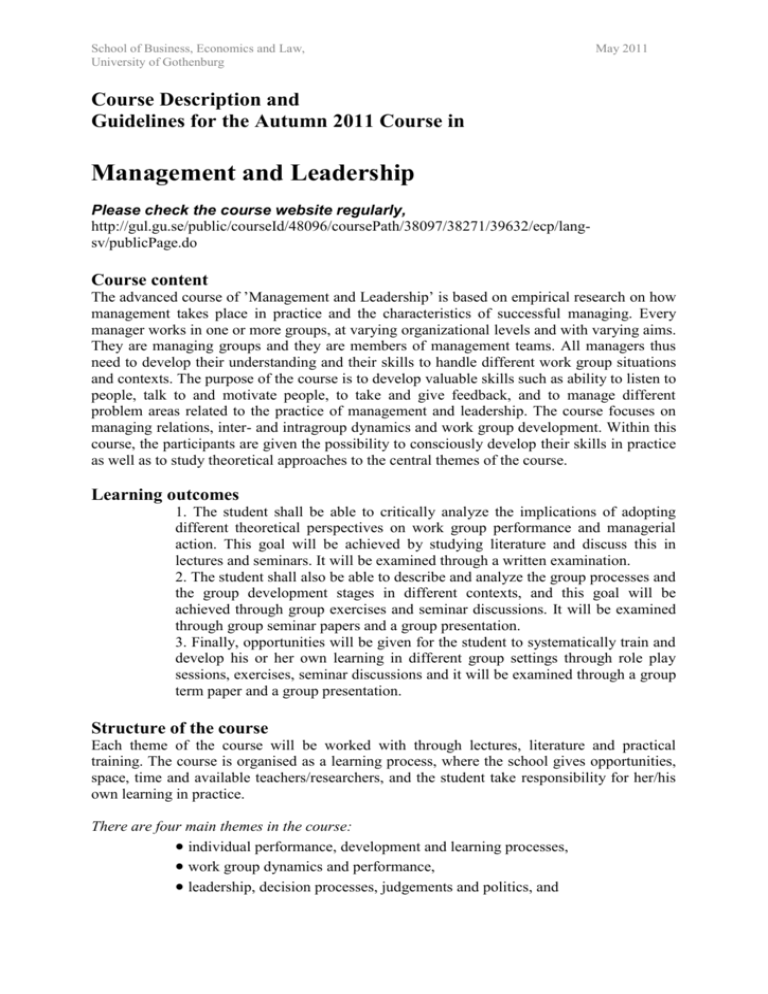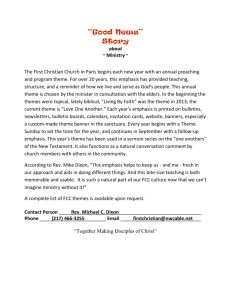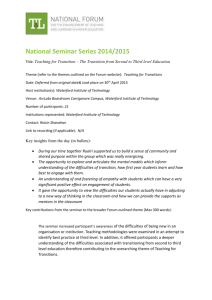Course content
advertisement

School of Business, Economics and Law, University of Gothenburg May 2011 Course Description and Guidelines for the Autumn 2011 Course in Management and Leadership Please check the course website regularly, http://gul.gu.se/public/courseId/48096/coursePath/38097/38271/39632/ecp/langsv/publicPage.do Course content The advanced course of ’Management and Leadership’ is based on empirical research on how management takes place in practice and the characteristics of successful managing. Every manager works in one or more groups, at varying organizational levels and with varying aims. They are managing groups and they are members of management teams. All managers thus need to develop their understanding and their skills to handle different work group situations and contexts. The purpose of the course is to develop valuable skills such as ability to listen to people, talk to and motivate people, to take and give feedback, and to manage different problem areas related to the practice of management and leadership. The course focuses on managing relations, inter- and intragroup dynamics and work group development. Within this course, the participants are given the possibility to consciously develop their skills in practice as well as to study theoretical approaches to the central themes of the course. Learning outcomes 1. The student shall be able to critically analyze the implications of adopting different theoretical perspectives on work group performance and managerial action. This goal will be achieved by studying literature and discuss this in lectures and seminars. It will be examined through a written examination. 2. The student shall also be able to describe and analyze the group processes and the group development stages in different contexts, and this goal will be achieved through group exercises and seminar discussions. It will be examined through group seminar papers and a group presentation. 3. Finally, opportunities will be given for the student to systematically train and develop his or her own learning in different group settings through role play sessions, exercises, seminar discussions and it will be examined through a group term paper and a group presentation. Structure of the course Each theme of the course will be worked with through lectures, literature and practical training. The course is organised as a learning process, where the school gives opportunities, space, time and available teachers/researchers, and the student take responsibility for her/his own learning in practice. There are four main themes in the course: individual performance, development and learning processes, work group dynamics and performance, leadership, decision processes, judgements and politics, and School of Business, Economics and Law, University of Gothenburg May 2011 communication and personal encounters. The theme about individual performance, development and learning aims at starting a process, which will continue through life. A device is that “a good leader is a good human being”, and this strive is lifelong. Also, a majority of management researchers and practitioners claim that to develop self-knowledge, self-reliance and integrity is important for managers and leaders. A leader doesn’t need to have self-assertiveness, rather be inquiring and reflecting, and to know one’s capabilities and try to develop them. Thus, the first and the last part of the course will deal about each and every participant as an individual and her and his learning goals and processes – in theory as well as in practice. In the work group theme we will investigate and experiment with different work group contexts and settings. The development of a work group through different phases, where the participants act and react in various both predictable and totally unpredictable ways will be experienced and analysed. The aim with this theme is that the participants learn about their own behaviour in different work group contexts, and that they also train analysing their experiences theoretically, reflect upon them and try to learn from those experiences for their own practical learning. The first two themes will imply several possibilities to experience leadership situations. The third theme focuses on getting the group to do things together and to detect, describe and analyse different patterns of interaction, power relations within them and leadership demands and possibilities. Here, we will also focus on the leadership learning processes of the participants, and engage in helping each other to develop in leading situations, making judgements and taking responsibility for actions. Through all the themes above, communicating is a means, or, rather, all the themes are communicating. The main activity of a leader is taking part in personal encounters, communicating. The fourth theme of the course is thus the concern of learning how to communicate in different situations, learning communicating as a leadership tool. We are going to study and train different communication techniques, and analyse the adequacy of using them in different contexts. Training communicating is more or less like training languages. There is a kind of “grammar” to learn, and “words”, and then every person has to train and adapt the way of using the language to one’s own personality and ways of behaving. Communicating at organisational, group and person-to-person levels, respectively, demand different kinds of communicating, though there are some common conditions in all human interaction. Through the course, each theme will be investigated through theoretical literature, individual and group reflection, experiment and training. There are group tasks during the course. Regularly, the student will be advised about relevant literature for each theme to study individually and discuss in small groups. Five small group tasks shall be delivered at the course website. One group task shall be presented orally in class. Examination and Grading For pass, the student must take part in at least 80% of the lectures and seminars of the course, deliver all seminar papers and the term paper, and take part in the exam. All papers and the exam must be of “passing quality”. This means at least 0,5 points for the group tasks and 7 School of Business, Economics and Law, University of Gothenburg May 2011 points for the exam. If the student gets ill or of other reasonable reason is absent, the course coordinator/teacher will give the student a special task to fulfill instead. If the student is absent from lectures and seminars more than stated above and/or for other reasons, the student will not pass the course. For pass with distinction, all seminar tasks/case reports and the exam must be done by showing a deeper understanding of the consequences of using different perspectives, by using literature extensively and by reflection about and analysis of one’s own learning process. The following activities will be examined: Seminar group tasks (five) maximum 1 point per task = 5 points together Group tasks with presentation (two) maximum 2 points = 4 points together Exam (individual) maximum 15 p In total, maximum 24 points can be given. For pass, 13 points are demanded, and for high pass 17 points. Both group tasks and the exam must be of passing quality. Grades are translated with a set model where the grades correspond to the following intervals in the ECTS scale: Pass with Distinction (väl godkänd, VG) A-B (17-20p = B; 21-24p = A) Pass (godkänd, G) C-E (13=E; 14=D; 15-16=C) Fail (underkänd, U) FX-F (12 p and below) Themes and literature All lecture/seminar-days have a theme. Articles and books are recommended to each theme (will be handed out at course introduction, and put out on the GUL web site). Some are compulsory and some are voluntary. All compulsory literature will be subject for examination (written individual examination), and all compulsory literature and all experiences during lectures and seminars will be examined through the group tasks. The voluntary literature is suggested for those who are interested in reading more about some subject but these will not be examined. All articles can be read and printed from internet. Books can be bought from bookstores or borrowed from our library. You are asked to read literature before each lecture/seminar day, and to reflect upon your experiences and the literature after each lecture/seminar day, and your general task is to reflect upon what you have read and experienced according to each theme, discuss them with your work group, and to write down the discussions, analysis and conclusions from the group discussions, by using theoretical models and concepts on your practice. Compulsory Literature: Jackson, B. and Parry, K. (2008 or 2011) A very short, fairly interesting and reasonably cheap book about studying leadership. London, Sage Publications. A compendium with tasks and literature – the compulsory articles can be downloaded from the GUL website and/or the library website. One article must be bought from Harvard for $3,95. One book-chapter can be borrowed from the teacher. School of Business, Economics and Law, University of Gothenburg May 2011 You are always welcome to search for your own literature and to discuss your interests with the teachers.







